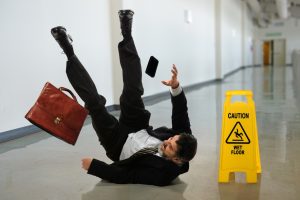What Do You Do If You Slip and Fall on a Wet Floor?
 One minute you’re walking as usual, and the next minute you’re on the ground in pain and confused. If you’ve ever slipped and fallen on a wet floor, you know that it can happen as fast as you can bat an eye. These incidents are not only physically painful but may be embarrassing or inconvenient as well, leaving you unsure of what to do next.
One minute you’re walking as usual, and the next minute you’re on the ground in pain and confused. If you’ve ever slipped and fallen on a wet floor, you know that it can happen as fast as you can bat an eye. These incidents are not only physically painful but may be embarrassing or inconvenient as well, leaving you unsure of what to do next.
Medical bills, missed work, and ongoing pain can quickly overwhelm you. Depending on where you fell, whether it be a store, restaurant, or other public place, you’re likely wondering about your legal options to pursue compensation for your injuries and losses.
Below, we’ll explain what to do after a slip and fall, especially if you suffered this accident in Arkansas. This guide covers premises liability law, how to help protect your rights, and the steps of starting a claim against parties potentially at fault.
After your fall, prioritize your health and safety.
Even if you don’t notice any discomfort or pain right away, that doesn’t mean you’re not injured. Severe injuries like concussions, internal bleeding, or joint damage don’t always present themselves at the time of the incident. The Centers for Disease Control and Prevention lists falls as the leading cause of injury among older adults. However, older adults are not the only age group at risk. Accidents can happen to anyone. Research shows adults of all ages, including young and middle-aged people, are susceptible to slips and falls.
Check for injuries
Do your best to maintain composure and assess yourself for any signs of injury, even the minor ones. Be on the lookout for symptoms such as bleeding, dizziness, bruises, swelling, or limited mobility. If you’re in severe pain, don’t try to get up on your own. Instead, call for assistance to help prevent further injury.
Seek medical attention immediately
A doctor’s visit will allow you to:
- Document your injuries to support possible future claims.
- Possibly link your fall to your sustained injuries.
- Help identify any serious health issues that may not be obvious.
Report the incident and document the scene
Notifying someone in charge and documenting the scene right away can help protect your rights and support future claims. There are a few critical steps to keep in mind.
Let management know about your fall
After you’ve examined yourself to see if you’re hurt, report the incident to a manager or supervisor without delay. In speaking with the person in charge, obtain their name, title, contact information, and request a written report of the incident. Before leaving the premises, ask for a copy of the report. After your conversation and once you’ve collected information from the business, you should send a written summary of your discussion for documentation purposes.
Document the scene and gather evidence
Evidence can disappear quickly, so it’s critical to document the scene as soon as possible. In the chaos of an incident, a lot of things can happen: signs are moved, floors are cleaned, and witnesses leave.
To paint a picture of the series of events, take photos and/or videos of:
- The location where you fell
- Visible liquids or spills
- Warning signs or lack thereof
- Your attire and clothes
- Your injuries
Collect witness information
If anyone witnessed your fall, ask for their name, contact information, and a brief statement regarding what they saw. Witnesses can be an asset in supporting your claim, but don’t worry if you don’t have a witness, as it isn’t necessarily detrimental to your case. Documenting the scene and notifying management can still help protect your rights, as they help tell the story of what happened.
Understand liability: Who may be responsible?
In Arkansas, businesses owe invitees a duty to use ordinary care to keep the premises reasonably safe and to warn of hidden dangers. If they fail to do so, they can be held liable.
Arkansas law generally requires showing either the owner created the hazard or that it existed long enough that the owner knew or should have known of it and failed to use ordinary care to fix or warn.
Consider the following scenario: A custodian mops the floor of a reception area and doesn’t place signage warning of the wet floor. If someone slips and falls, the office owner may be liable. This is not to say that if the person somehow contributes to the fault, the owner will be held entirely responsible. If the person was texting while walking, they could be found partially at fault.
This legal principle is known as a comparative fault rule, which Arkansas follows. According to this rule, if you are found partially at fault for your accident, your compensation may be reduced by your percentage of fault. The law declines to award damages if you’re determined to be 50% or more at fault.
Common places where wet floor accidents occur
Slip and fall accidents can happen just about anywhere, yet they usually occur in high-traffic areas. This increased likelihood is probably due to these spaces being cleaned frequently or having smoother, slippery surfaces. Common locations include:
- Grocery stores
- Restaurants
- Retail stores
- Office buildings
- Healthcare settings
Regardless of the location, the law expects property owners and occupiers to use reasonable care in maintaining safe conditions for visitors.
Consider consulting a personal injury attorney
The owner or occupier’s property insurance company will likely not hesitate to reach out to you after your fall. They might ask for your statement or even offer a quick settlement, but be cautious when speaking with insurers. They’re trying to protect the company’s best interests, not yours.
Avoid admitting fault, stating you’re “fine,” signing any paperwork, or making any statements without first seeking legal advice. Engaging a personal injury attorney can help you appropriately respond.
Understand your legal options after your fall
An attorney can:
- Investigate whether the entity or person responsible for the property failed to act reasonably
- Gather additional documentation, like surveillance footage or maintenance records
- Communicate with insurance companies and the owner or occupier’s legal counsel
- File a lawsuit on your behalf if you have a claim
To prevent being barred from bringing a lawsuit, it’s essential to file within the statute of limitations. For most personal injury claims, Arkansas requires a suit to be filed within three years of the accident. Depending on the location of your fall, for instance, if the claim involves a municipal or government defendant, the window may be shorter.
Talk to an Arkansas personal injury attorney today
Slipping on a wet floor can have long-lasting consequences. You have the right to hold the property owner or occupier responsible for their actions or lack of action. Be mindful that time is not on your side. The sooner you get medical care, document the scene, and consult an attorney, the stronger your claim may be.
If you or a loved one has suffered injuries, contact Greer Injury Lawyers, PLLC today for a consultation about your options and whether you have a claim. We are well-versed in Arkansas premises liability laws and thoroughly work to support our clients at every step of the legal process.

Since graduating magna cum laude in 2005 from the University of Memphis School of Law, Thomas has helped make a difference in the lives of victims of serious personal injury, wrongful death, and professional negligence. Thomas has extensive trial experience in both state and federal court. Among other victories in the courtroom, Thomas obtained several impressive jury verdicts and settlements
Read more about Thomas R. Greer
